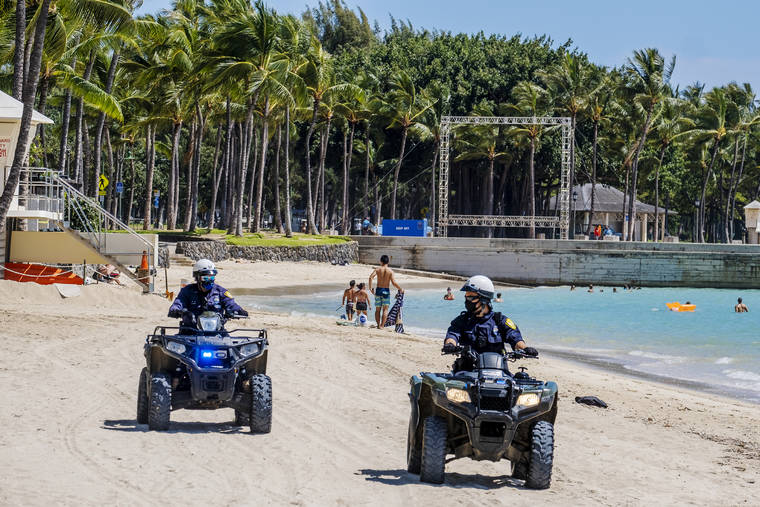Ex-cops could lead quarantine and mask crackdowns in Hawaii


STAR-ADVERTISER
Honoluu police patrol Waikiki Beach on April 7.


Efforts are underway to create a statewide force of retired police officers to further crack down on Hawaii’s mask-wearing requirements and track down more people who violate COVID-19 Opens in a new tab quarantine laws.
“We’re just hoping to get it under control so that we can get tourism back and open the state back up,” Angela Keen of Hawaii Quarantine Kapu Breakers told the Honolulu Star-Advertiser’s Spotlight Hawaii online program on Friday.
State Sen. Donovan Dela Cruz, chairman of the Senate Ways and Means Committee, was planning to submit a resolution calling for a task force that could create another layer of COVID-19 enforcement, but on Friday told Keen he was proposing a bill instead, Keen said.
“We’re very, very excited about that,” Keen said.
Dela Cruz later told the Star-Advertiser that new language was added to Senate Bill 1117 Opens in a new tab, an existing bill to make emergency appropriations for COVID-19 that was amended to create a task force.
“We still have a lot of issues with compliance,” Dela Cruz said. “Hopefully the task force will bring together all the law enforcement agencies and include the citizens that are most concerned about the violations. It’s meant for everyone to work together. … It’s like a modern day posse with the kinds of different technology that we have.”
Don't miss out on what's happening!
Stay in touch with breaking news, as it happens, conveniently in your email inbox. It's FREE!
The retired officers would be paid from unused CARES Act funds and, potentially, from an anticipated new round of federal stimulus, Keen said.
The retired officers could work through the state Attorney General’s office, which has been following up on tips from Kapu Breakers to cite and arrest COVID-19 quarantine violators.
“Our group would assist them in giving them leads or tips … when it comes to mask or quarantine enforcement,” Keen said.
Both residents and tourists are violating quarantine laws, but it’s tourists who are mostly flouting mask-wearing rules, she said.
“It’s really bad,” Keen said. “The hot spots are Waikiki, Ko Olina, Lahaina, Kona town. Those are the areas that we’re looking at. The visitors just don’t seem to get it and it could be that maybe in their state they don’t have a mask law. … Some say they’ve been vaccinated. Others say they’ve been tested and they don’t feel the need to wear a mask.”
Fewer quarantine violators are outing themselves on social media, Keen said, but they still leave clues about their intentions for Attorney General investigators to follow.
They “end up sort of blabbing their mouths to airline attendants (and) say, ‘I don’t believe in quarantine. I don’t believe in corona.’ … They pass the information on to us. We find out the name and the location and they’re able to go after them,” Keen said.
There is also hope of reducing misdemeanor penalties for not wearing a mask down to a potential citation of $100 to $150, Keen said.
“Local residents would end up being hit with a $5,000 fine whereas a tourist might come in and rip up tickets and just leave,” Keen said. “The visitors get away scot-free. The locals end up paying their tickets and it’s not fair. So we want to see that brought down to lower than a misdemeanor, maybe a $100, $150 fine that can be paid on the spot.”
Asked about other changes she would like to see, Keen said greater effort needs to be made to alert travelers about Hawaii’s mask rules as soon as they start making reservations.
“There needs to be touch points at every level when somebody books their trip,” she said. “They need to do more digital advertising so that it’s popping up on their phones reminding them to wear a mask as soon as they leave the hotel, that when they book their ticket there’s a pop-up that says Hawaii has a mask law. It needs to be at every touch point. … It’s all about the mask.”




